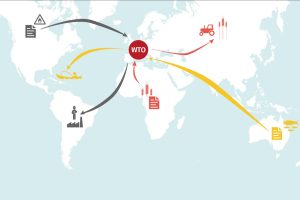A truth that is fundamental to humanity’s existence is that the Ocean sustains life on planet Earth. Think only of the way the Ocean provides us with over 50 percent of the oxygen we breathe, and the motivation to secure the Ocean’s health is incontrovertible. With that health now under growing threat from human activities, be it by way of the effects of climate change, pollution or overfishing, there’s little doubt 2019 will be a critical year for protective action on behalf of the Ocean.
To lead that action we have a universal Ocean goal, namely SDG 14 (life below water) of the UN’s Sustainable Development Goals, which came into being in September 2015 when all nations of this planet agreed to adopt these universal Goals. SDG 14 aims to deliver conservation and sustainable use of the Ocean’s resources through ten targets, four of which mature in 2020. To meet these four targets by next year and demonstrate real progress towards the other six, it is obvious that 2019 must be a year of deliberate action to protect the Ocean’s well-being.
For a quick understanding of the targets of SDG 14, I recommend reference to the Oceans Conference website in which they are clearly set out. There you will see that the four targets due to mature in 2020 relate to: sustainably managing and protecting marine and coastal ecosystems; effectively regulating fish harvesting and ending overfishing; conserving at least ten percent of coastal and marine areas; and prohibiting certain forms of fisheries subsidies which contribute to overcapacity and overfishing.
It is the latter target, removal of harmful subsidies, that is the subject of this article. Target 14.6 states that by 2020 we must “prohibit certain forms of fisheries subsidies which contribute to overcapacity and overfishing, eliminate subsidies that contribute to illegal, unreported and unregulated fishing, and refrain from introducing new such subsidies.” In this regard, the target’s wording specifically defers to ongoing negotiations at the World Trade Organization (WTO).
Two factors thus emerge for action on harmful fisheries subsidies: firstly, the ball is in the WTO’s court; and secondly, thanks to the 2020 deadline, we have entered the year in which the bulk of the game must be played. Thus, 2019 is effectively the year in which we will win or lose our long struggle to rid global fisheries of harmful subsidies.
There are a couple of very logical reasons why these harmful subsidies have to go. Firstly, there is serious overcapacity in the global fishing fleet currently hunting down the Ocean’s diminishing fish stocks. Secondly, some of these subsidies assist the fishing fleets which are engaged in illegal fishing, the latter criminal activity amounting to USD 23 billion worth of fish being stolen per annum. To put it bluntly, this is akin to paying burglars to rob your neighbor’s house.
Another reason the elimination of harmful fisheries subsidies is close to my heart is because it would free up large amounts of public funds that could be used for positive action in support of SDG 14’s other targets. It is estimated that governments are annually spending between USD 18 billion and 20 billion in harmful fisheries subsidies. Just think what USD 20 billion could buy in terms of management of marine protected areas, or assistance to artisanal fishers in developing countries!
I carried this message to the 11th Ministerial Conference of the WTO in Buenos Aires, Argentina, in December 2017, to encourage WTO negotiators to act in support of SDG 14’s call for the prohibition of harmful fisheries subsidies. For nearly two decades, the WTO had been discussing the problem and possible solutions, during which time global fish stocks continued their steady decline.
SDG 14’s 2020 deadline served as a wake-up call. In the lead-up to the 11th Ministerial Conference, no less than seven proposals were put forward by different groups of WTO members with a view to achieving the deadline. While the 11th Ministerial Conference was unable to resolve all the issues, it did adopt a Ministerial Decision on Fisheries Subsidies wherein all WTO members “agree to continue to engage constructively in the fisheries subsidies negotiations, with a view to adopting by the Ministerial Conference in 2019, an agreement on comprehensive and effective disciplines.”
While this was a disappointing outcome at the time, the positive difference from previous years created by this Ministerial Decision is palpable. Throughout 2018 it has been encouraging to observe that since the Buenos Aires conference, trade negotiators have steadily worked on the issue. At WTO headquarters in Geneva, they have put together a 2019 roadmap to be followed in the run-up to SDG 14’s 2020 deadline.
One must acknowledge that these are testing times for the WTO, with multiple tensions at play in world trade negotiations. Particularly, in the fisheries discussions, in addition to domestic political sensitivities, one has to recognize that the WTO has been tasked with technical fisheries issues that are outside the normal scope of the Organization’s purely trade-focused dimension, and the disciplines will have to be framed also considering the environment and the development dimensions. Meanwhile, the WTO’s 12th Ministerial Conference has now been postponed until June 2020, with Kazakhstan as the venue. Considering the procedures involved in giving effect to the removal of subsidies, this new date will probably be too late to secure the elimination of harmful fisheries subsidies by SDG 14’s 2020 deadline.
Since SDG 14 is a universal goal and given that failure to protect the health of the Ocean is not a rational course for humanity to follow, decisive action from the WTO is needed this year. I therefore join with others in strongly urging that the WTO hold a high-level special session in Geneva, Switzerland, before the end of 2019, in order to agree on the “comprehensive and effective disciplines” necessary to prohibit harmful fisheries subsidies.
WTO Director-General Roberto Azêvedo likes to remind us that the WTO is central to achieving the SDGs. Rightly so, for the WTO has a central role to play in preventing us from trading away life on our planet, and of course that grave responsibility extends to protecting life in the Ocean.
Regardless of status, every nation, indeed every person in the world, has a stake in ensuring the resilience of the Ocean. Thus, whether they are fishing nations or not, all WTO members should come together in 2019 and do the right thing for people and planet by prohibiting harmful fisheries subsidies. The most effective way of doing that would be the holding of the proposed high-level special session in Geneva this year.
* * *
This article was written by Peter Thomson, UN Secretary-General’s Special Envoy for the Ocean.


